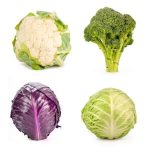Cruciferous Confusion
Did you skip out on the cabbage on St. Pat’s day because you read somewhere that cruciferous vegetables are “goitrogens” and bad for your thyroid?
Is this true?
Answer: Not exactly.
What are cruciferous vegetables?
Cruciferous vegetables to the family Brassica (see list below) and are low calorie nutrition power houses packed with fiber, vitamins, minerals, antioxidants, and phytonutrients. These are all good for you. “Goitrogens” are isothiocyanates and thiocyanates found in these vegetables. They might improve your immune system and lower your cancer risk.
A negative effect on thyroid function has only been shown in animal model studies. A negative effect has not been shown in humans. There might be a negative effect on your thyroid function only if you are low in iodine intake and eat an excessive amount of raw cruciferous vegetables daily. So, two to three spears of lightly steamed broccoli is okay with your dinner, two to three pounds of broccoli, maybe not.
Cruciferous vegetables: Arugula, Broccoli, Brussels Sprouts, Cabbage, Cauliflower, Collard Greens, Horseradish, Kale, Mustard Greens, Radishes, Rutabaga, Turnips, Wasabi, Watercress
